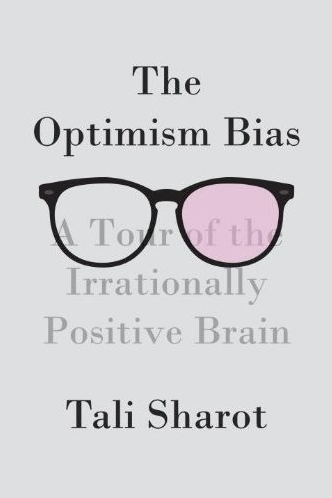previous
Apocalypse now: Mexico City today and our level of concern
starting exploration
Questions and thoughts related to “A Matter of Time”
- Attached to the essay "A Matter of Time"
Are we hard-wired for optimism?
Posted February 27, 2012 12:58 pmThis posting about a new book, “The Optimism Bias,” by Tali Sharot, appeared on BrainPickings.com, February 26, 2012. The book argues that optimism is an evolutionarily selected trait that supports survival. Makes sense to me. Even people who are not optimistic in their personal lives find it hard to believe in the possibility of apocalypse for the world, despite all the bad news regarding climate change. Whenever we entertain the possibility of a dire outcome, our minds go to all the bad prognoses that turned out not to be true, drowning out our fear. Is the inclination to believe in a good outcome deeper than rationality itself?
THE OPTIMISM BIAS
 “The reason pessimism is easily escapable, as Martin Seligman posits, might just be that its opposite is our natural pre-wired inclination. At least that’s the argument British neuroscientist Tali Sharot makes in The Optimism Bias: A Tour of the Irrationally Positive Brain — a fascinating yet accessible exploration of how and why our brains construct a positive outlook on life even in the direst of circumstances, and one of 7 essential books on optimism.
“The reason pessimism is easily escapable, as Martin Seligman posits, might just be that its opposite is our natural pre-wired inclination. At least that’s the argument British neuroscientist Tali Sharot makes in The Optimism Bias: A Tour of the Irrationally Positive Brain — a fascinating yet accessible exploration of how and why our brains construct a positive outlook on life even in the direst of circumstances, and one of 7 essential books on optimism.
Sharot has been studying “flashbulb memories” — recollections with sharp-edged, picture-like qualities, usually about unexpected arousing or traumatic events — since the 9/11 attacks, investigating why the brain tends to “Photoshop” these images, adding contrast, enhancing resolution, inserting and deleting details. This phenomenon led her to probe deeper into the neural system responsible for recollecting these episodes from our past — a system that, contrary to previous belief, hadn’t evolved just for memory but to also imagine the future. These shared neural networks gleaned insight into how the brain generates hope, why we’re able to move forward after trauma, and what makes the brains of optimists different from those of pessimists.
The optimism bias protects us from accurately perceiving the pain and difficulties the future undoubtedly holds, and it may defend us from viewing our options in life as somewhat limited. As a result, stress and anxiety are reduced, physical and mental health are improved, and the motivation to act and be productive is enhanced. In order to progress, we need to be able to imagine alternative realities — not just any old realities, but better ones, and we need to believe them to be possible.”
Anther recent book that takes up the subject of hard-wired optimism is Thinking, Fast and Slow by Daniel Kahneman, a psychologist who won the 2002 Nobel in economic science. According to Jim Holt’s NYTimes Sunday Book Review piece, Kahneman’s particular interest is in human irrationality. One the cognitive biases he has studied he calls the “pervasive optimistic bias,” which he says, “may well be the most significant” of all. Holt points out that “a bias towards optimism is obviously bad, since it generates false beliefs—like the belief that we are in control, and not the playthings of luck. But without this “illusion of control,” would we even be able to get out of bed in the morning? Optimists are more psychologically resilient, have stronger immune systems, and live longer on average than their more reality-based counterparts. Movreover, as Kahneman notes, exaggerated optimism serves to protect both individual and organizations from the paralyzing effects of anaother bias, “loss aversion”: our tendency to fear losses more than we value gains. It was exaggerated optimism that John Maynard Kernes had in mind when he talked of the “animal spirits that drive capitalism.”
And we know where those spirits got us in 2010.
topics: culture
share
 site feed
site feed
Can information be inherited?
An interesting essay in the NY Times Science Section (8/21.12), by reporter Doreen Carvajal, posited the notion that "generations pass on particular survival skills and ...
Can we hold on to optimism with its benefits while preventing risk?
Tali Sharot, in a interesting TED talk, delineates the benefits of optimism: in short, "without optimism, we would all be depressed." We remain optimistic despite ...
When realism spells doom
In a NY Times op-ed piece entitled Game Over for the Climate, James Hansen recently wrote about President Obama's Rolling Stone interview, in which ...
If optimism is hard-wired, what do we do when it imperils us?
Al Gore and many others who are spearheading the fight against climate change emphasize that it is not too late. They try not to engage ...



Dr. Andy Rose April 17, 2012 at 8:45 am
This is a very emotional subject. With much curiosity, I seem content to let my optimism wash over rationality when confronted with evidence for pessimism. In many way, given the human record of brutality against our own kind, it is questionable to remain optimistic. Yet, I find myself easily accepting statements by Mother Teresa that small acts of kindness … I end where I began with a thought: our emotions supersede our rationality!